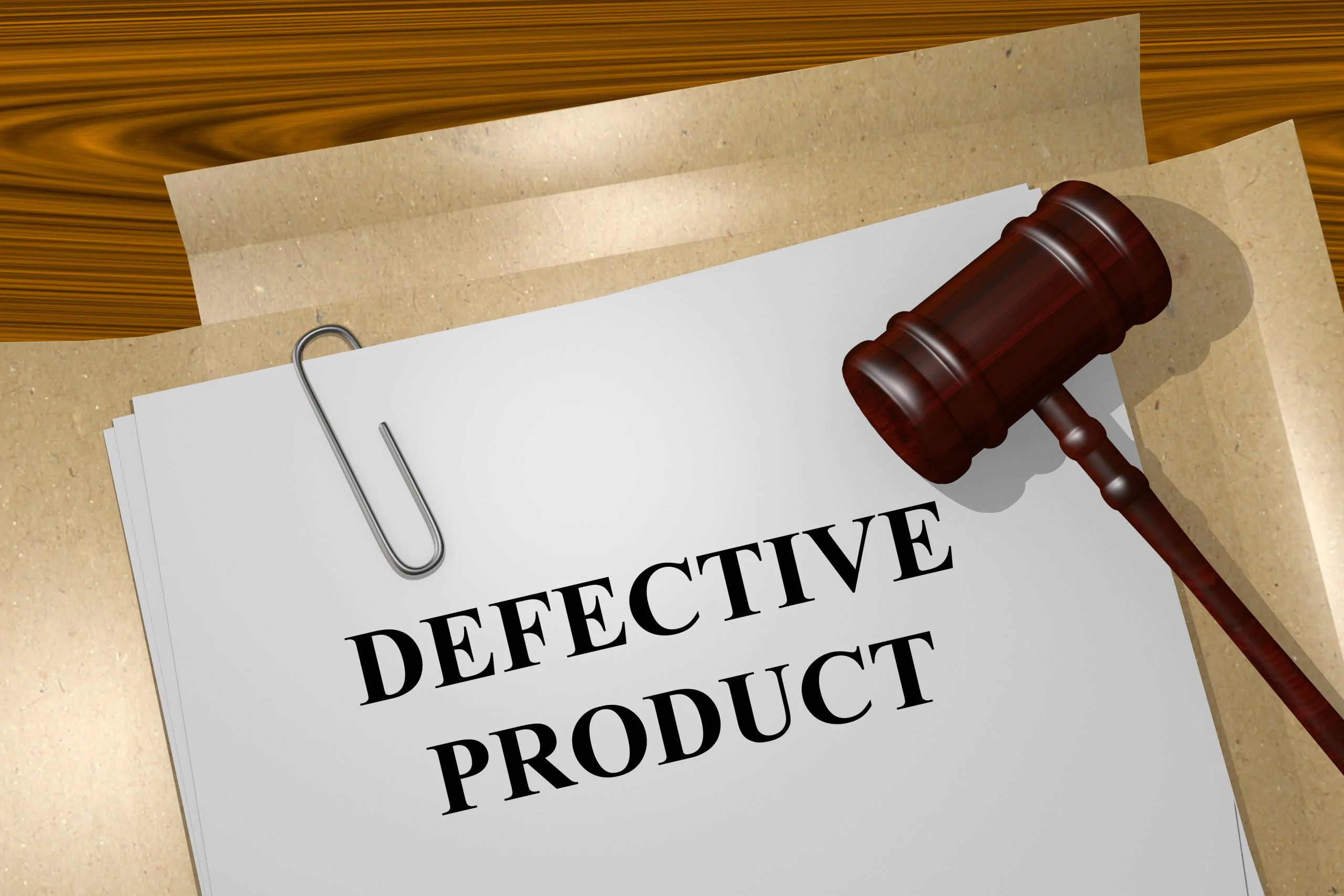Defective products are often handled either through personal injury lawsuits, toxic torts, or both. These are civil court actions that an individual or his attorney can file. The purpose would be to seek compensation for the illness or injury that the product caused. Or, if enough people are harmed by the same defective product, a mass tort case can be made, where every victim gets a portion of a resulting settlement.
What Counts as a Defective Product?
A defective product is a consumer good that causes injury or illness and as such constitutes grounds for a lawsuit to recover damages. Someone harmed by a product defect has a right to take legal action to recover medical costs, loss of income and more. This legal action is often called a product liability claim.
When a product doesn’t work as advertised, or does not resemble how it was presented by the company, this does not necessarily mean it is defective. Disappointment alone is not grounds for a consumer to file a product liability claim. The product must also cause harm and/or illness for a company to be held liable.
When are You Eligible to File a Lawsuit?
To initiate legal action over a dangerous product, drug, or medical device, the case must meet several criteria. Otherwise, the court action will not succeed and will waste time and money. Factors that make one eligible to file a defective product lawsuit include:
- Proof of injury: It is not enough that a product is defective or dangerous. Each person who takes legal action must prove that he or she was injured or harmed by this product, according to Nolo. Just having the product in the house or even using it means nothing in court if no one was hurt. Being able to document this injury, such as with medical records, is just as vital. The more documentation the stronger the case.
- Proof of defect: There must be evidence that the product, its instructions, or packaging, had a defect. If the product is missing an appropriate warning, that too can be a defect, according to Nolo.
- Clear link between an injury and product defect: There must be a connection between an injury and a product defect, says Nolo. A person might need stitches after cutting their finger with a knife, but is that injury the knife’s fault or was distraction to blame? The injury must be clearly linked to the defect. Maybe the knife is so flimsy, it breaks apart and results in injury.
- Evidence of proper use: The lawsuit will have to show that the injury or illness happened while the product was being used as intended. An example of misuse might be mixing chlorine and vinegar, which creates toxic fumes. These products work well on their own as cleaning products but are not intended to be mixed.
- Statute of limitations: To be eligible to file a lawsuit means acting within a prescribed timeline. In New York State, there is a deadline of three years to file a complaint and other required documentation, says Nolo. That’s three years from the date that the initial injury or illness occurred.
Examples of Defective Products That Face Lawsuits
Defective product lawsuits have covered everything from weed killers to many types of medication and medical devices. Recent defective product examples include:
- Actos: Prescribed to treat patients with type 2 diabetes, Actos presented serious side effects, including bladder cancer, heart attacks, kidney disease, and an increased risk of bone fractures.
- Enfamil & Similac: Babies, especially preemies, have contracted an intestinal disease known as necrotizing enterocolitis (NEC) from formulas primarily made from cow’s milk. The companies Enfamil and Similac sold these formulas, manufactured by Abbott Labs and Mead Johnson Co. respectively.
- Roundup: A weed killer relied on by both farmers and home gardeners alike, Monsanto’s Roundup contains glyphosate, suspected of causing several varieties of cancer. According to the manufacturer’s own records, approximately 8,700 lawsuits have been filed alleging Roundup-related health issues.
- Hip & knee prostheses: Many patients are facing the ordeal of a second knee or hip surgery due to several knee and hip protheses that have been recalled from the market. These defective products have caused unnecessary suffering and as such are the grounds for legal action.
- Sleep apnea devices: Due to cancer concerns, Philips Respironics has recalled its continuous positive airway pressure devices (CPAP) and BiLevel positive airway pressure (BiPAP) devices. According to recent studies, the foam in these sleep apnea devices may degrade into a toxic state linked to health issues including cancer.
- Hernia mesh products: For some hernia patients, surgery to install a medical device known as mesh has turned into a horror story. The mesh can move and even perforate the bowel. Thousands of patients are taking legal action over similar occurrences.
- Elmiron: Unexplained vision loss is the claim against the makers of Elmiron, the only FDA-approved drug to treat interstitial cystitis (IC). Janssen Pharmaceuticals is the manufacturer facing claims that their bladder medication causes retinal damage.
- Talcum powder: Numerous lawsuits have focused on claims against Johnson & Johnson’s baby powder and other talc-based products they market, like Shower-to-Shower. The question raised in these lawsuits is whether talcum powder causes cancer
- Paraquat: A common herbicide for weed and grass control in farming, Paraquat is now considered highly poisonous by the Centers for Disease Control and Prevention with a high probability of causing Parkinson’s Disease.
Mass Tort Lawsuits
Because defective products injure many people, it is not uncommon for victims to combine forces in mass tort lawsuits seeking compensation. A mass tort is a case that involves a company that harms or injures numerous individuals by failing to do one or more of the following:
- Warn consumers of any safety dangers
- Does not take action in fixing a dangerous product defect after learning of an item’s potential dangers
- Falsely advertising a product as safe for the individuals it harms
A mass tort action is a collective lawsuit that involves multiple victims that suffer the same injuries and/or illnesses due to a specific product defect. For example, mass torts are often initiated by those hurt due to the absence of a warning label, making them eligible to sue a corporation, manufacturer, retail store, etc.
How to File a Defective Product Lawsuit
To initiate a legal action in civil court, one starts with filing a complaint and other necessary documentation with the court clerk. The clerk then moves the legal case forward by issuing summonses to those accused.
There are three main types of product liability claims that a lawyer will consider pursuing:
- Manufacturer: This is a defect that arises during manufacturing;
- Design: Here the flaw originated in the design of the product;
- Labeling: The product may not have injured anyone at all if it had gone out with a warning label. (Consider a hair dryer missing the warning label to avoid contact with water.)
It’s important to consider whether the defect falls within one or more of the above categories because the lawsuit should cover all possible responsible parties. In fact, the general rule is to list all parties in the chain of distribution. This means everyone from the manufacturer, down to suppliers and retailers if appropriate.
It takes work on the part of the attorney and the injured party to build a successful case. Anyone harmed by a defective product is going to want to save that product. Also, it is often important for victims to document everything involved with the case, especially doctor visits and medical care related to the defective product.
Product liability claims can be complicated, and often need the expertise of a skilled attorney if they are to be successful and fully compensate an injured person for their damages.
Contact a Defective Product Attorney Today
If you or a loved one has sustained injury or illness through a defective product, Sobo & Sobo has the skill and experience to deliver a successful court outcome. With a free consultation, potential clients have nothing to lose and everything to gain: financial compensation for damages. Call 855-GOT-SOBO, contact online, or visit one of our office locations.




